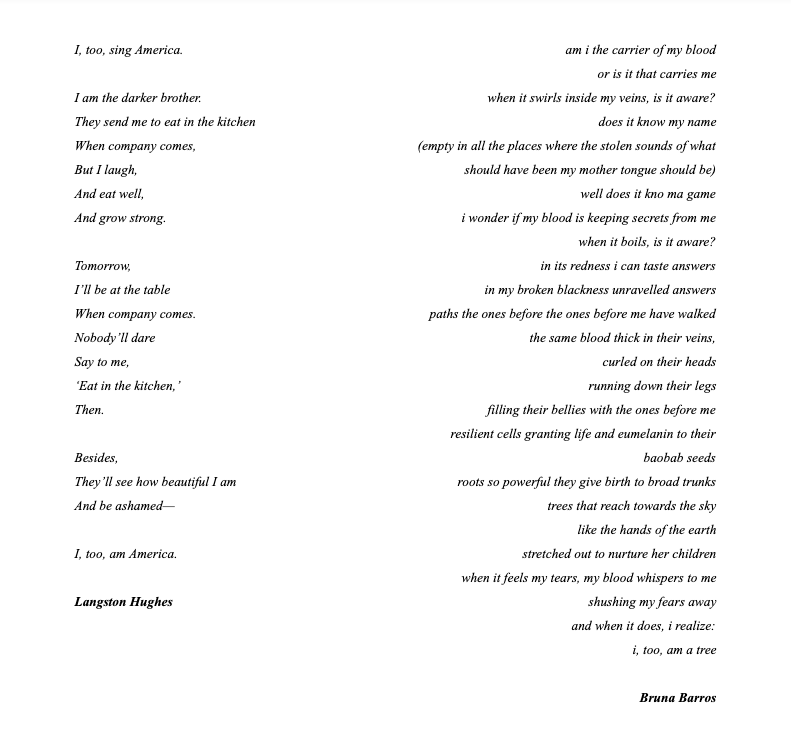

Sem a Prática da Tradução Negra Não Há Internacionalismo Negro
Without the Practice of Black Translation There is No Black Internationalism
The linguistic pluralism we have in the diaspora can be a paradigm for the transnational struggle. Also through it, we can look at our herstory in a global - not only local - level. It can also be a means to:
less isolation
more exchange
less intrusion
more us, about us.
We are archives, we have a linguistic-sensual-memorialistic-futuristic collection that goes beyond tongues and national borders. This common tongue we share as a productive space of critical-creative fabulation is made of mythical-poetical motivations, it is (the production of ) ourselves.
To translate ourselves is a mirror-looking learning process.
Re-encounters
imagined, dreamed, articulated and encoded by our ancestors,
re-encounters with them.
And there is so much more than the written modern colonial European languages to be translated among us:
There are eyes and looks and
the way our bodies move
there are dances and smiles
and secret
plans
and symbols
and sounds
and maps
sensations
there is the intricate intermingle of our cells
and there are our differences
all of them
impossible to translate
but still we play
and trace our plans
still we feel
still we pray
always (for) Eshu
We need to challenge and scrutinize our differences within the Black diaspora, the grammars of blacknesses around the world. The practice of translation within black transnational communities can be of great use in this exercise.
The matter of dealing with languages that are not our own - but which we have to own
this one is for black folks esse aqui é pro povo preto
this one is for the snap divas
this one is for the muxoxos, the clickers, the hmmm mms
this one is for the dykes, the greatest tongue masters
(shoutout to the multilingual sapatonas)
this one is for our ancestors who spoke in tongues
this is a celebration poem:
we share a body language
in color, shape and manner
The struggle is real
I call my sister and she says hello
she feels understood when I laugh at her jokes
even though
she can’t even begin to grasp mine
I taste her interdentals when I have breakfast
then brunch
then dinner
my tongue tires trying to memorize
how to stand between my teeth and the air I breathe
I call my sister and she asks how are you
I say tô bem
she laughs because it is so funny
my accent is, she tells me
she eats the arroz e feijão I cook for her
she chews the nasal vowel I offer her
but she never swallows
I was never able to get
a porra do visto
but she comes here whenever she pleases
she never knocks, she’s funny like that
she feels at home
because I try to sound like her
because she recognizes the joy and the pain
but she can also fly away
I wonder if she can really understand me
if we can unify the struggle
if she can’t see me struggling to understand her
if the struggle is real, elas que lutem
amém, a luta continua
Disclaimer
I don’t speak portuguese
I don’t speak spanish
I speak pretuguês
I am cheia de manha
I like it when my dengo me faz um cafuné
I give her a xêro
Trespass
if black internationalism can't exist without translation,
who are the ones translating?
if translation is the key to the cultural borders,
who drew them?
who got the passports?
how can we belong to a state nation?
when all they ever did to us was teach us
how to long
betrayed by national tongues
who didn’t raise us
(why would we call them mothers?)
I’m the earth’s daughters
the oceans will not be my grave
they’ll be my ways
through them I shall walk
and connect
Translating in the Black Atlantic - The ethics and aesthetics of translation
Find a friend you really like
grab a bottle of something - your throat will need it
translation is a conversation
you can cook together,
mincing vegetables you grew yourselves
don’t chase the words - they’ll come to you
instead, sit by a breezy place
let the sun bathe you
listen to your friend
create, write and make
dream up
and remember
remember
remember

Um sorriso negro
um abraço negro
traz felicidade(Sorriso Negro by Adilson Barbado, Jair de Carvalho and Jorge Portela)
